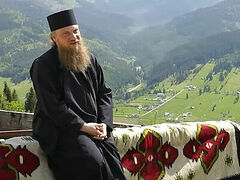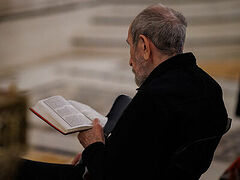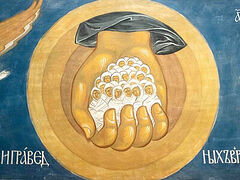“That which ye have already hold fast till I come”
But unto you I say, and unto the rest in Thyatira, as many as have not this doctrine, and which have not known the depths of Satan, as they speak; I will put upon you none other burden. But that which ye have already hold fast till I come (Rev. 2:24-25). God will not allow them to face great trials if only they preserve what they have before His coming. This is a very important word from Christ. “Keep what you have until I come.” It’s like our Baptism. What happens in the Sacraments isn’t just a ceremony—it has its own essence. During Baptism, the priest gives you a candle so you understand what you’re receiving at that moment. You’re given a fire that you have to preserve, living in such a way that no one extinguishes it in you. Because throughout your life, satan will try to extinguish your candle through all kinds of circumstances, temptations, and sins. And if he manages to extinguish it, then he drives grace out with the help of sin. Christ says here: “Keep what you have. Keep it until I come.” Our struggle is to preserve the grace of God until Christ comes—until the Second Coming, until the end of our life (which is coming soon). Until Christ visits us, we must preserve this grace.
And he that overcometh, and keepeth My works unto the end, to him will I give power over the nations: And he shall rule them with a rod of iron; as the vessels of a potter shall they be broken to shivers: even as I received of My Father. And I will give him the morning star. He that hath an ear, let him hear what the Spirit saith unto the Churches (Rev. 2:26-29). The morning star is the one that shines and heralds the morning and the sun. It’s a symbol of victory, a symbol of light, a symbol of the coming of the Sun of Truth, Christ. We all have ears, but which of us hears is another question. We all have eyes, but which of us sees? We have to ask these questions sometimes. Christ often speaks about it: He that hath ears to hear, let him hear (Mt. 11:15, 13:9). Of course, we’re not deaf—we can hear. But do we hear with our hearts? Do these words enter into our hearts? If they had, we’d probably be different.
“Thou hast a name that thou livest, and art dead”
Let’s briefly look at the next epistle, the epistle to the bishop of the Church of Sardis, a city in Asia Minor. And unto the angel of the Church in Sardis write; These things saith he that hath the seven Spirits of God, and the seven stars; I know thy works, that thou hast a name that thou livest, and art dead (Rev. 3:1). These words should shock the person reading them. These are words of Christ outside the four Gospels; this is the only book besides the four Gospels in which Christ Himself speaks to us. It’s fearful, what He says to the bishop: “By name you’re alive, but in reality, you’re dead.” This is a terrible word of Christ to us. Why was he dead? Because he sinned before God; he did something that made his soul dead.
We have said that sins brings death to the soul. It’s hard when the soul of a man dies. But God has the power to raise the dead. This is our hope. We have to examine ourselves, whether we’re alive or not. And how can we know that someone has died? When he doesn’t answer. You push him, talk to him, kick him, turn him around—nothing, he’s dead. You check his pulse—it’s stopped, he’s dead. It’s the same in the spiritual life. You tell him one thing, another, but nothing touches him. Trials, sorrows, and difficulties happen in his life, but he doesn’t come to himself. There’s nothing inside him that could direct him to God.
When we were on the Holy Mountain, there was a good man who would often come visit us there. He was a scientist and an atheist. He was a good man, selfless; all the good there can be in a man was in him. But he was an atheist. He would often come see his close relative, a monk. He never went into the church, not even out of curiosity. I suggested that he go into the church at least once for the sake of interest, but he said: “No, I’m an atheist.” One time I took him to Katounakia, to Fr. Ephraim. Fr. Ephraim gave him a real electric shock. Along the way, I explained to the young man that here, on the Holy Mountain, we don’t say to each other: “Good evening! How are you?” They communicate a little differently there. And among the older generation, there were also some Athonites who were a little rude. You had to speak to them in a fitting way: “Bless!” And then kiss their hand. The young man refused to kiss his hand. I said: “What bad thing will happen to you? There are eighty-year-old monks here who spent fifty years among these rocks. This man is a great prophet. Why’s it hard for you to kiss his hand?” “No, I won’t do it.”
 Athonite monks. Photo: orlov74.livejournal.com
Athonite monks. Photo: orlov74.livejournal.com
As soon as Fr. Ephraim saw him, he turned to him and said:
“Come here, captain!”
Certain people were called “captains” in Fr. Ephraim’s time.
“Sit down. Do you go to church?”
“No.”
“That’s why you stink.”
He told us to go outside and he “checked” the guy, leaving him without a penny, as they say. He was inside for a whole hour. Fr. Ephraim told him his whole life down to the hour he was born—he told him everything. The guy came out, sweating, in tears, wanting to confess. It was a miracle! Glory to Thee, O Lord! He came to his senses.
Another elder, who had prayed for this man for many years, had a vision. While praying for him, he saw him in a coffin, dead. He ran up to push the coffin so the man would fall out. When he touched the guy, he was like smoke; it was impossible to grab onto him. An angel of the Lord appeared and said: “Father, don’t try in vain; he’s dead.” Unfortunately, indeed, he didn’t believe; he remained steadfast in his ways; his soul was already dead. He didn’t feel anything anymore. Even this electric shock from Elder Ephraim didn’t wake him up.
Perhaps we’re the same. Or maybe even worse. At least he admitted he was godless, while we say we’re Church people, and we go to talks, and to Confession, and we commune, and we fast. We’re so scrupulous that we might call the radio station ten times to ask if we’re eating oil today. But try to approach and touch him. Or if he finds out that his son wants to become a monk or a priest, then we'll see what happens. Yet, we consider ourselves very “alive.”
A man came to Mt. Athos to become a monk. He was followed by his father, who went to catechetical talks, was a member of a religious organization, and came to get his son so he wouldn’t become a monk. He wanted to commune the next day. I asked him: “Aren’t you embarrassed to commune?” He said: “Father, I came to the Holy Mountain, how can I not commune?” “And what was your purpose in coming to the Holy Mountain? You want to take your son, who decided to become a monk. I can’t allow you to commune.” I didn’t permit him to receive Communion. This was a Church person. He stirred us all up, making a fuss.
You know, there’s nothing scarier than a man who thinks he’s churchly but who’s actually dead. Another knows that he’s not close to the Church, but there’s a glimmer of hope that he’ll wake up one day, that he’ll be able to get his head straight, come to his senses, and repent for living without God. And we, supposedly churched people, consider ourselves good people. We’re pious, but we commit the most serious sins. The most terrible sins aren’t lust and fornication, but hatred, hostility, and avarice.
Look at what avarice does with people in the Church. Stern dictators. Among such people, we know some employers—a fearful work. Sometimes people come for advice: “Father, I want to go work for this man. He’s a believer.” “Son, go somewhere else! He’ll swallow you alive.” “But he’s always in church…” Yes, he can spend whole days in church, fast without oil, but if you go work for him, he’ll eat you up. It’s scary. Our elder said: “Who do they believe in? Kronos? Haven’t they ever read the Gospel?”
Christians, spiritual people, are ready to trample on their subordinates; they drink the blood of others, they don’t give a single penny of alms. They make a scandal over millions; they make a scandal over ten pennies; they’re stingy; it’s horrible what’s going on inside them. They’re dead on the inside. The other guy at least knows he’s dead. But this guy thinks he’s alive, thinks he’s a Church man. It’s scary. And it’s unlikely that such people will be resurrected. He lives like a werewolf.
Be watchful, and strengthen the things which remain, that are ready to die: for I have not found thy works perfect before God (Rev. 3:2). Because of your carelessness, because of your indifference, the rest of the Church members are in danger of dying. If you, the bishop, are dead, what’s left for the rest of them? The others will also doze, and they may die. Wake up and encourage others so they don’t perish. Your deeds won’t stand before God, they’re useless; you have no deeds to present before God.
Remember therefore how thou hast received and heard, and hold fast, and repent (Rev. 3:3). This applies to all of us. We all have to remember what we were like when we came to the Church, how God took us out of the ignorance and darkness we were in and led us to Himself; brought us closer. How our soul came alive then, how it burned with love for God. We heard His word and it lived within us. We hurried to church to receive Communion, to Vigil; we wanted to fast, to hear the word of God. It was like that; we experienced it, but then we lost it. We lost it because of our negligence. We started to sin and lost it.
But we have to remember that the only way to wake up is to remember where you fell from. Turn around and look at where you were, how you began, and where you wound up. Our elder would say: “Where you came from—go back there again.” Through the same door. Look at how you fell, how you cooled off, why you froze. So go back. Start struggling as before; do what you used to do with joy but now only with compulsion. Repent of everything that’s happened to you. Repent, weep, and ask God to visit your soul.
If therefore thou shalt not watch, I will come on thee as a thief, and thou shalt not know what hour I will come upon thee (Rev. 3:3). “I will come like a thief, unexpectedly, when you least expect it, and I will turn everything upside down.” Thou hast a few names even in Sardis which have not defiled their garments; and they shall walk with Me in white: for they are worthy (Rev. 3:4). You see, man is a name [in the Greek text: “έχεις ολίγα ονόματα”—“you have a few names”]; there are no nameless ones for God. Everyone has their own name. There were several people in Sardis who, despite the bishop, remained undefiled by a wicked life. “They will walk with Me, because they’re worthy; they have kept their garments clean, have no dirtied them with heresies or the sins of the Nicolaitanes.
He that overcometh, the same shall be clothed in white raiment; and I will not blot out his name out of the Book of Life, but I will confess his name before My Father, and before His angels. He that hath an ear, let him hear what the Spirit saith unto the Churches (Rev. 3:5-6). “Whoever remains faithful and overcomes, him I will clothe in white robes.” They remind us of the white robes we wore in Baptism; white robes symbolizing a pure life. Whoever remains faithful will inherit a place in the Kingdom of God.






